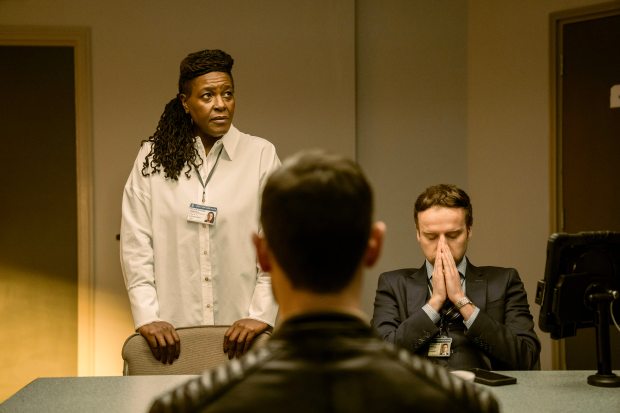With the holidays upon us, you might be looking to curl up with a British detective show. The kind of quietly straightforward procedural that is occasionally wry, occasionally laden with gloom — even if it’s just the gray skies overhead. There are no gimmicks. Nobody’s a genius. Just slow and steady shoe leather investigations: Asking questions, squinting at the evidence and solving a crime.
I have my concerns about copaganda as a genre but I’m not immune to the satisfying pleasures of a well-told murder mystery. And if the lead detective is especially talented on the job, you can be sure their personal life is considerably wonkier. Because these are British shows, the detectives aren’t armed, which means they never draw a gun. This is all about brainwork.
With that in mind, here’s a roundup of shows with new episodes on Acorn, the niche streamer that specializes in offerings from the UK.
“Whitstable Pearl”
Number of seasons: Three (six episodes one-hour episodes per season).
Based on Julie Wassmer’s novels, Kerry Godliman stars as Pearl Nolan, who was briefly a cop before a pregnancy derailed her career. In the 18 years since, she’s been running a beachside seafood restaurant with her spikey mother (Frances Barber) and son (Rohan Nedd) in the small, chilly, coastal town of Whitstable.
When she’s not shucking oysters, Pearl moonlights as a private detective. Inevitably, she finds herself teaming up with the new cop in town (Howard Charles), a tall, handsome widower who is a man of few words. He’s repressed and withdrawn, but their chemistry gives the show a quiet will they/won’t they energy.
Running a restaurant is time-consuming and hard enough, how does Pearl have time to moonlight as an investigator? Who knows, but it’s her very averageness that makes the character tick. She’s well-liked and interested in sorting things out and righting wrongs. Once she’s got her teeth into a thing, she’s not likely to let go.
“Dalgliesh”

Number of seasons: Three (six 45-minute episodes per season; the stories are two-parters, for a total of three book adaptations each season).
Two things set “Dalgliesh” apart: Its 1970s setting and the wonderfully restrained performance by Bertie Carvel as veteran detective and published poet Adam Dalgliesh. What an odd combination, someone says: A policeman and a poet. “It has its uses,” he replies enigmatically. The man gives nothing away. Based on the novels by P.D. James, Dalgliesh is a widower (his wife and baby died in childbirth a year before the series begins), but he seems like someone who would have a quiet, intensely private demeanor regardless. He’s also graceful and contemplative, keeping everything close to the vest. He drives a green Jaguar sports car, which is an unexpectedly flashy touch, indicative of his sense of style, or a midlife crisis.
Sometimes he considers leaving the job, but that’s really just “a trick I play on myself sometimes; I tell myself I can stop so that I can keep going.” No surprise, he’s formal; when a lower-ranking colleague asks impertinently, “What kept you?” he responds with the subtle reprimand, “What kept you, sir.” But he doesn’t have to raise his voice. Though soft-spoken, his words are deliberate and have import, and he approaches the job with a thoughtful intelligence while all others are spinning out around him. He’s observant and his facial expressions are subtle and controlled, as if he’s always squinting against the sun, even (or especially) if there’s no sun in sight.
“Inspector Ellis”

Number of seasons: One (three 90-minute episodes).
The show premiered last month and it’s good right out of the gate. Here’s hoping more seasons are on the way. Sharon D. Clarke stars as Detective Chief Inspector Ellis, who is called in when the local constabulary is failing. Their investigations have stalled either because of incompetence or corruption, so she parachutes in “like the Wicked Witch of the West, starting from scratch, no team, no support.”
Often she’s greeted with suspicion. Sometimes even derision — “DCI Lend a Helping Hand,” one cop sneers — not only because she’s taking over, but because she’s a Black woman taking over. The passive-aggressive racism and sexism among these mostly white, male detectives is ever-present. (The women, however, are quietly appreciative of her presence.) When a DCI on a new case introduces himself to her, he says, “I’m in charge.” She calmly stares at him. “But you’re not. Not anymore.” She’s very adept at quietly asserting her authority.
Clarke’s performance suggests there’s so much going on inside Ellis’ head; she’s only voicing a fraction of it. She has a sharp understanding of human nature and which approach is needed at any given moment, whether it’s compassion or something more steely. She’s reticent but graceful, striding through the countryside in her long navy blue wool coat. Methodical and deliberate, she doesn’t jump to conclusions. Her phone is forever running out of juice and her charger has seen better days. But her mind is always at 100%. In the first episode, she meets the eager DS Harper (Andrew Gower) and he’s impressed enough with her that he becomes her permanent No. 2.
“The Chelsea Detective”

Number of seasons: Two (four 90-minute episodes per season, plus a Christmas special that premiered earlier this month).
Adrian Scarborough stars as Detective Inspector Max Arnold in “The Chelsea Detective.” His patch, as the title makes obvious, is the Chelsea neighborhood of London. He’s estranged from his wife (there are ways to give male characters depth other than a dead or absent wife!), rides a bike to get around the city and lives on a houseboat. Occasionally his busybody aunt (played by “Whitstable Pearl’s” Frances Barber) tells him how sad his life has become and that he needs to buck up.
This is perhaps the most straightforward of all the series, but it’s solid and entertaining. In the Christmas special, a pop star from an earlier generation is found dead, drowned in her bathtub. The investigation takes Max to a private club with soaring columns and wood-paneled rooms called The New Imperial Club. What is this place, his colleague asks. “It’s where British men sketched out their ambition for an empire that straddled half the world.” A grimace is the only appropriate response.
Nina Metz is a Tribune critic.



